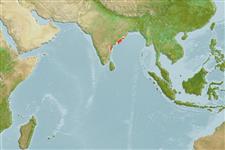Teleostei (teleosts) >
Eupercaria/misc (Various families in series Eupercaria) >
Nemipteridae (Threadfin breams, Whiptail breams)
Etymology: Parascolopsis: Greek, para in the side of + Greek, skolos = stake + Greek, ops = appearance (Ref. 45335).
Eponymy: Dr Marinus Boeseman (1916–2006) was a Dutch ichthyologist, working in the Department of Zoology, Rijksmuseum van Natuurlijke Histoire, Leiden, becoming Curator of Fishes (1947–1981). [...] (Ref. 128868), visit book page.
Environment: milieu / climate zone / depth range / distribution range
Ecology
Marine; demersal; non-migratory; depth range 150 - 300 m (Ref. 28016). Tropical; 20°N - 14°N, 80°E - 86°E (Ref. 3810)
Eastern Indian Ocean: known only from a single specimen collected off Waltair, India.
Size / Weight / Age
Maturity: Lm ? range ? - ? cm
Max length : 9.7 cm SL male/unsexed; (Ref. 122102); max. published weight: 2.50 g (Ref. 122102)
Dorsal spines (total): 10; Dorsal soft rays (total): 9; Anal spines: 3; Anal soft rays: 7. Head scales reaching forward to level of posterior nostrils. Posterior margin of preopercle more or less vertical. Lower limb of preopercle naked. Posterior margin of suborbital finely denticulate. Pectoral and pelvic fins long, reaching to beyond level of anus. Axillary scale present. Color: Body rosy-yellow.
Occurs on sand or mud bottoms in offshore waters. Feeds mainly on benthic invertebrates. No major fishery exists.
Life cycle and mating behavior
Maturity | Reproduction | Spawning | Eggs | Fecundity | Larvae
Russell, B.C., 1990. FAO Species Catalogue. Vol. 12. Nemipterid fishes of the world. (Threadfin breams, whiptail breams, monocle breams, dwarf monocle breams, and coral breams). Family Nemipteridae. An annotated and illustrated catalogue of nemipterid species known to date. FAO Fish. Synop. 125(12):149p. Rome: FAO. (Ref. 3810)
IUCN Red List Status (Ref. 130435: Version 2024-2)
Threat to humans
Harmless
Human uses
Fisheries: minor commercial
Tools
Special reports
Download XML
Internet sources
Estimates based on models
Preferred temperature (Ref.
123201): 11.9 - 16.6, mean 12.9 °C (based on 7 cells).
Phylogenetic diversity index (Ref.
82804): PD
50 = 0.5002 [Uniqueness, from 0.5 = low to 2.0 = high].
Bayesian length-weight: a=0.01445 (0.00683 - 0.03057), b=2.98 (2.81 - 3.15), in cm total length, based on LWR estimates for this (Sub)family-body shape (Ref.
93245).
Trophic level (Ref.
69278): 3.5 ±0.37 se; based on food items.
Resilience (Ref.
120179): High, minimum population doubling time less than 15 months (Preliminary K or Fecundity.).
Fishing Vulnerability (Ref.
59153): Low vulnerability (10 of 100).
